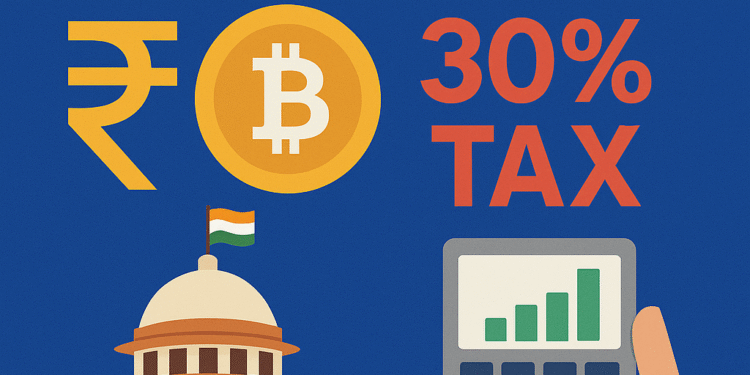With 30% TAX on crypto gains now a reality for Indian investors, it’s vital to grasp the tax implications. The Indian government has also introduced a 1% TDS on crypto transactions. This makes it key for investors to understand the tax rules.

The year 2025 is a critical time for Indian crypto investors. The government is fine-tuning its regulatory framework. With big gains in Bitcoin and other digital assets, investors face a tough tax regime. The current tax includes a flat 30% tax on gains and a 1% TDS on each trade. This poses big challenges for investors.
Key Takeaways
- Understanding the 30% tax rate on cryptocurrency gains in India.
- Implications of 1% TDS on crypto transactions.
- How to report crypto income and losses in 2025.
- Choosing the right ITR form for crypto investments.
- Reporting crypto gains via Indian exchanges vs foreign ones.
The Changing Landscape of Crypto Taxation in India
India is moving towards a more regulated cryptocurrency market. 2025 is a key year for crypto investors. The government is tightening its control over crypto transactions, which will change the market a lot.
A 1% Tax Deducted at Source (TDS) on crypto transactions has already cut trading volumes. This is part of a bigger effort to regulate the market. It aims to make sure investors follow tax laws.
Why 2025 Is a Pivotal Year for Indian Crypto Investors
2025 is important for Indian crypto investors. It marks a big change in how the government views cryptocurrency. The government is working on a clear tax framework for crypto, and 2025 is when it will start.
Investors need to get ready for a new tax world. This will mean stricter rules and higher taxes.
Growing Government Regulation and Market Impact
The government’s growing control over crypto in India will affect the market a lot. Investors will face more scrutiny and could face penalties for not following rules.
A big part of this is a new tax framework for crypto. Here’s what’s expected to change:
| Regulatory Change | Impact on Investors |
|---|---|
| 1% TDS on crypto transactions | Reduced trading volumes, increased tax compliance |
| Stricter reporting requirements | Increased administrative burden, improved transparency |
| Clearer tax framework | Reduced uncertainty, increased compliance |
As the Indian government keeps changing its crypto rules, investors must stay updated. They need to adapt to these new changes.
Understanding Virtual Digital Assets (VDAs) in India
It’s key to grasp Virtual Digital Assets (VDAs) to get through India’s changing crypto rules. VDAs play a big role in how India handles crypto rules and taxes.

Legal Definition of VDAs Under Indian Law
VDAs are defined in Section 2(47A) of the Income Tax Act. They are any info or code made through crypto that has value and can be moved, stored, or traded online. This includes things like cryptocurrencies, tokens, and other digital values.
This definition is clear on what digital assets are for tax purposes. It’s important for those investing or trading to know this to follow tax laws.
Crypto’s Legal Status: Regulated but Not Legal Tender
Cryptocurrencies are seen as VDAs and are watched by Indian law. But they’re not seen as legal money. This is important because it changes how they’re taxed and regulated.
The rules for VDAs in India are changing. The government wants to support new ideas while keeping investors safe. Knowing where cryptocurrencies stand is key to moving through this area.
Crypto Tax India 2025: Core Taxation Framework Explained
The Indian government has set a clear tax policy for 2025. This policy is simple yet effective. It’s important for investors to know about this framework.
The Flat 30% Tax Rate on All Crypto Gains
India’s 2025 crypto tax policy has a key point. It sets a flat 30% tax rate on all crypto gains. This means any profit from selling or trading cryptocurrencies is taxed at 30%.
This tax rate is the same for everyone. It makes it easier for investors to figure out their taxes.
The 30% tax on crypto gains is a big change. It treats cryptocurrency as a special asset class. Investors need to know this rate applies to all crypto deals, like buying, selling, or exchanging.
1% TDS on Qualifying Transactions Under Section 194S
There’s also a 1% Tax Deducted at Source (TDS) on qualifying transactions under Section 194S. This rule requires a 1% deduction from the total amount paid for VDAs. This deduction is made by the buyer or the person paying for the VDAs.
This 1% TDS under Section 194S aims to improve tax compliance. Investors must report these transactions in their tax returns. It’s important to keep detailed records of crypto deals.
To follow the new rules, investors should keep good records. These records should include the date, amount, and who they traded with. This helps in figuring out taxes and following TDS rules.
Key Limitations in India’s VDA Tax Structure
It’s important for crypto investors to know about the limits in India’s VDA tax rules. The Indian government has rules for Virtual Digital Assets (VDAs) that can affect how investors plan their money. These rules can change how much money investors make and how much they pay in taxes.

No Expense Deductions Except Acquisition Cost
One big limit is that you can’t deduct most expenses except for the cost of buying VDAs. This means crypto investors can only deduct the cost of acquiring the VDAs. They can’t deduct other costs like transaction fees or charges. So, the taxes on gains are based on the total income from selling VDAs, without subtracting expenses.
Prohibition on Loss Set-offs Against Other Income
Another big limit is that you can’t use losses from VDAs to offset other income. This rule means that losses from crypto investments can’t be used to reduce gains from other sources, like a job or other investments. This makes it harder for investors to plan their taxes and finances.
This rule is tough for active crypto traders who see big changes in their investments. It shows the importance of careful planning and thinking about taxes when investing in VDAs.
Capital Gains Treatment for Cryptocurrency in India
Cryptocurrency investments in India face a special tax rule. Unlike regular investments, there’s no difference between short-term and long-term gains.
No Distinction Between Short-term and Long-term Gains
The Indian tax code has a flat 30% tax on all cryptocurrency gains. This rule doesn’t care if you held your crypto for a day or years. Your gains are taxed the same.
This rule makes taxes easier for crypto investors. But, it might not help long-term investors as much. They could have gotten a break with lower taxes for holding onto investments longer.
Comparison with Traditional Investment Taxation
Traditional investments in India, like stocks and real estate, have different tax rates. Short-term gains are taxed more than long-term ones. This encourages people to invest for the long haul.
- Short-term capital gains tax hits gains from assets held under a year (e.g., 36 months for some assets).
- Long-term gains get taxed less, which is good for long-term investment.
But, crypto gains in India are taxed at a flat 30%. This means all gains are treated the same, no matter how long you held them. This shows how crypto rules are changing in India.
Mandatory Reporting Requirements for Crypto Investors
The Indian government has introduced new crypto tax rules for 2025. These rules highlight the need for crypto investors to report their Virtual Digital Assets (VDAs). Investors must follow specific regulations for this reporting.

Crypto investors must report their gains in Schedule VDA. This is a new part of the income tax return forms. It’s made for those who earn income from VDAs.
Schedule VDA: Required Forms and Disclosures
To meet these new rules, investors need to file their tax returns with the right ITR forms. They should use ITR-2 or ITR-3 if they have income from VDAs.
| ITR Form | Usage | Relevance to Crypto |
|---|---|---|
| ITR-1 | For individuals with income from salary, interest, and other basic sources. | Not applicable for crypto investors with VDA gains. |
| ITR-2 | For individuals and HUFs having income from other sources, including capital gains. | Applicable for crypto investors with capital gains. |
| ITR-3 | For individuals and HUFs having income from business or profession. | Applicable for full-time crypto traders. |
Who Cannot Use ITR-1 for Crypto Reporting
Those with income from VDAs can’t use ITR-1 for tax returns. ITR-1 is for simple income sources like salary and interest. It doesn’t cover capital gains or business income, which includes VDA gains.
Crypto investors must pick the right ITR form. This ensures they meet reporting requirements and avoid penalties.
Compliance Guidelines for Different Taxpayer Categories
In India, different taxpayer groups have unique rules for their crypto investments. It’s key to know these rules to stay compliant and avoid fines.
Salaried Employees with Crypto Investments
Employees who invest in crypto need to understand the tax rules. They must report their crypto gains in their tax returns. The tax rate for these gains is a flat 30%, no matter their income level.
Key Compliance Requirements:
- Reporting crypto gains in ITR forms
- Paying the applicable 30% tax on gains
- Maintaining records of transactions for audit purposes
Full-time Crypto Traders and Businesses
Full-time crypto traders and businesses have more complex rules. They must keep detailed records of all transactions. Their crypto activities are seen as business income, taxed at the usual rates.
| Compliance Aspect | Requirement for Traders/Businesses |
|---|---|
| Record Keeping | Detailed records of all transactions |
| Tax Treatment | Business income, taxed at applicable rates |
| Audit Requirements | Subject to audit under certain conditions |
NRI Investors: Special Considerations
NRI investors face special rules for crypto in India. They must understand the tax implications in both India and their home country. NRIs are taxed at the same 30% rate, but may have extra reporting duties.
Important Considerations for NRIs:
- Understanding tax residency implications
- Fulfilling reporting requirements in both India and their country of residence
- Being aware of possible Double Taxation Avoidance Agreement (DTAA) benefits
Critical Deadlines for Crypto Tax Compliance in 2025
As we get closer to 2025, Indian crypto investors need to know the key tax compliance deadlines. The Indian government has set specific dates for filing income tax returns (ITR) that include gains from cryptocurrency investments.
Standard ITR Filing Deadline: September 15, 2025
The standard deadline for filing ITR for the financial year 2024-2025 is September 15, 2025. It’s important for crypto investors to make sure they’ve calculated their gains and losses right. They should file their returns by this date to avoid penalties.
“Missing the deadline can result in significant penalties and even lead to legal complications,” says a tax expert. So, it’s wise to prepare your documents early.
Belated Returns Deadline: December 31, 2025
If you miss the standard deadline, you can file belated returns. The deadline for belated returns is December 31, 2025. But, filing belated returns comes with a big late fee and interest on the tax due.
It’s important to remember that while the belated returns deadline offers some relief, it’s best to file on time. This way, you avoid extra financial stress.

Crypto investors should mark these critical deadlines on their calendars. This ensures they follow tax regulations and avoid penalties.
Undisclosed Crypto Income: The 60% Tax Penalty
India has made a big change in its crypto tax policy. Starting in 2025, there will be a 60% tax penalty for not reporting crypto income. This move aims to stop tax evasion and make sure crypto investors follow the rules.
Definition of ‘Undisclosed Income’ for VDAs
‘Undisclosed income’ means earnings from VDAs that aren’t reported. The new rule says any unreported gains from crypto are taxable. This includes profits from trading, mining, or other crypto activities not shown in tax returns.
Key aspects of undisclosed income for VDAs include:
- Earnings not reported in tax filings
- Gains concealed during income tax searches or surveys
- Income not disclosed in the annual information return
Enforcement Mechanisms Effective February 1, 2025
Starting February 1, 2025, the Indian government will have strict rules to catch and punish those who don’t report crypto income. The income tax department can search and survey to find unreported VDA transactions.
The enforcement mechanisms include:
- Enhanced scrutiny of tax returns claiming VDA transactions
- Authority to conduct searches and surveys to detect unreported VDA income
- Levy of a 60% tax penalty on undisclosed income from VDAs
The government wants to make crypto investments more transparent and compliant. Investors should keep accurate records of their crypto dealings and report their income correctly. This way, they can avoid the big penalty.
Exchange and Intermediary Reporting Obligations
The Indian government has brought in new rules. These rules make exchanges and intermediaries report certain info to the Income Tax authorities. This is part of a bigger plan to make the cryptocurrency market more transparent and compliant.

Mandatory Reporting to Income Tax Authorities
Now, exchanges and intermediaries must share some transaction details with the Income Tax department. They need to report on the transactions and who was involved. The aim is to make sure all crypto deals are documented and taxed right.
Key reporting requirements include:
- Details of transactions above a certain threshold
- Information about the parties involved in the transactions
- Records of transactions, which can be subject to audit
How Your Trading Data Is Shared with the Government
When you trade on an exchange or through an intermediary, your data is collected. The new rules say this data must be shared with the Income Tax authorities. This sharing is secure and only includes the tax info needed.
It’s essential for traders to understand that their transaction data is being reported to the government. Knowing this can help traders follow tax laws and avoid penalties.
Taxable Crypto Events Under 2025 Regulations
It’s key for investors to know about taxable crypto events under India’s 2025 rules. These new tax rules make it clear what counts as a taxable event. This affects how investors handle their crypto deals.
Trading Activities: Buying, Selling, and Converting
Buying, selling, and converting cryptocurrencies are taxable. When you sell or swap your cryptos, any profit you make is taxed. The 30% flat tax rate hits all gains from these deals. Keeping detailed records of your trades is a must.
For example, if you sell Bitcoin for a profit, that gain is taxed. Exchanging one crypto for another is also taxed. Remember, the tax is on the gain, not the whole deal.
Non-Trading Events: Gifts, Mining, Staking, Airdrops
Receiving cryptos as gifts, through mining, staking, or airdrops is also taxable. Getting crypto through these ways is seen as income and is taxed.
For instance, mining crypto makes the mined coins’ value at receipt taxable income. Receiving crypto as a gift or through an airdrop also makes the value at receipt taxable.
It’s important to track these events and report them correctly in your taxes. This ensures you follow the rules.
In summary, knowing about taxable crypto events under India’s 2025 rules is critical for following the law and planning taxes well. By understanding what’s taxable, investors can manage their crypto better and meet their tax duties.
Penalties and Enforcement for Tax Non-Compliance
India is cracking down on cryptocurrency taxes in 2025. It’s key to know the penalties for not following the rules. The government has set up strict measures to make sure everyone follows the new tax laws. This means crypto investors need to understand the risks of not following these rules.
Fines for TDS Avoidance and Misreporting
The Indian tax authorities have a strong system to catch and punish those who avoid TDS or misreport. Fines can be as high as 300% of the tax amount evaded. For example, if someone doesn’t report a crypto gain, they could face a penalty of up to 300% of the tax owed, plus the tax itself.
| Offense | Penalty Range |
|---|---|
| TDS Avoidance | 100% – 200% of tax evaded |
| Misreporting | 200% – 300% of tax evaded |
Criminal Liability and Possible Jail Terms
In serious cases of tax evasion or misreporting, criminal liability can apply. This could lead to jail time. The tax authorities can take legal action against those who willfully evade or misreport taxes. The punishment could be 3 to 7 years in jail, along with big fines.

Crypto investors must keep accurate records and follow tax laws to avoid harsh penalties. Getting help from a tax expert who knows about cryptocurrency can help stay compliant and avoid risks.
Practical Strategies for Crypto Tax Compliance in 2025
The year 2025 brings big changes to crypto taxation in India. The government is making rules stricter. Investors need to follow practical steps to stay compliant. This means keeping good records and getting help from experts.
Record-Keeping Best Practices
Keeping accurate records is key for crypto investors. You should write down every transaction. This includes the date, time, amount, and the cryptocurrency’s value at that time. Good records help figure out gains and losses and are needed when filing taxes. Don’t forget to track any fees from transactions.
| Record Type | Description | Importance |
|---|---|---|
| Transaction Records | Date, time, amount, and value of cryptocurrency | High |
| Fee Records | Any fees associated with buying, selling, or transferring crypto | Medium |
| Wallet and Exchange Statements | Regular statements showing holdings and transactions | High |
Working with Tax Professionals Specializing in VDAs
Working with tax pros who know VDAs is very helpful. They get the tax laws and can guide on compliance and savings. They help with tax filing and make sure you use all deductions.
By using these strategies, crypto investors in India can follow 2025 tax rules. It’s about being ready and proactive for crypto tax changes.

Conclusion: Navigating India’s Crypto Tax Landscape in 2025
India’s crypto market is growing fast. Knowing the crypto tax rules in 2025 is key for investors and traders. The new rules include a 30% tax on all crypto gains and a 1% TDS on certain transactions.
It’s vital to keep up with the reporting needs, how to follow the rules, and the fines for not doing so. Investors need to know what events are taxable, like trading and gifts.
By understanding and following India’s crypto tax rules in 2025, investors can cut their taxes and avoid fines. As the crypto market expands, knowing how to handle taxes will be more important. This will help investors reach their financial goals.
FAQ
What is the tax rate on cryptocurrency gains in India for 2025?
In India for 2025, the tax rate on cryptocurrency gains is a flat 30%. This applies to all crypto gains, under the current tax regime.
Is there a distinction between short-term and long-term capital gains for cryptocurrency in India?
No, there’s no difference in India between short-term and long-term capital gains for cryptocurrency. All gains are taxed at a flat 30% rate.
What is the TDS rate on cryptocurrency transactions in India?
In India, the TDS rate on cryptocurrency transactions is 1%. This applies to qualifying transactions under Section 194S.
How do I report my cryptocurrency gains and losses in my income tax return in India?
To report your cryptocurrency gains and losses in India, use Schedule VDA. File the right ITR form based on your taxpayer category.
Can I set off my cryptocurrency losses against other income in India?
No, under the current tax regime, you can’t set off cryptocurrency losses against other income in India.
What are the penalties for undisclosed cryptocurrency income in India?
For undisclosed cryptocurrency income in India, the penalty is 60% of the undisclosed income. This applies from February 1, 2025.
Are cryptocurrency exchanges required to report transactions to the Income Tax authorities in India?
Yes, cryptocurrency exchanges must report transactions to the Income Tax authorities in India. This is part of the mandatory reporting requirements.
What are the critical deadlines for crypto tax compliance in 2025 in India?
The deadline for filing ITR is September 15, 2025. The deadline for belated returns is December 31, 2025.
How can I ensure compliance with the crypto tax regulations in India?
To comply, keep accurate records of your cryptocurrency transactions. Consider working with tax professionals who specialize in VDAs.
What are the implications of not reporting cryptocurrency income in India?
Not reporting cryptocurrency income in India can lead to penalties, fines, and criminal liability. This includes the possibility of jail terms.
Are there any tax exemptions or deductions available for cryptocurrency investments in India?
No, there are no tax exemptions or deductions for cryptocurrency investments in India. The only exception is the acquisition cost.
How do non-resident Indians (NRIs) report their cryptocurrency income in India?
NRIs must report their cryptocurrency income in India using the right ITR form and Schedule VDA. They need to consider their specific tax residency status.






